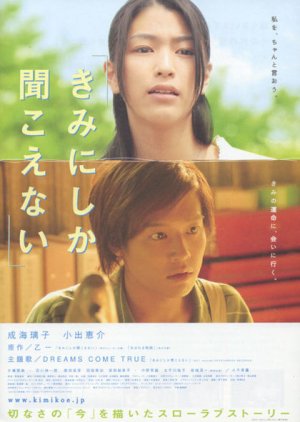
Directed by Hagishima Tatsuya, Kimi ni Shika Kikoenai (a.k.a. Calling You) is based on the same-titled light novel series by popular writer Otsuichi. Like Otsuichi's Waiting in the Dark, which was also recently adapted for the big screen, Kimi ni Shika Kikoenai revolves around two lonely young people who find each other in an uncommon manner. Shy, quiet, and unsure of herself, Aihara Ryo doesn't quite fit in anywhere. Though she wants to make friends, she has trouble speaking up and holding a normal conversation like everyone else. It seems that whenever she talks, the words just don't come out correctly. Gradually, Ryo has gotten used to living life in silence as a lonely and introverted student. With no one to talk to, Ryo also has no need for a cell phone. Longing for friends to talk to, she creates a cell phone in her mind for imaginary phone conversations, and much to her surprise, one day Shinya picks up on the other side. For the first time in her life, Ryo has found someone she can talk to.

Directed by Hagishima Tatsuya, Kimi ni Shika Kikoenai (a.k.a. Calling You) is based on the same-titled light novel series by popular writer Otsuichi. Like Otsuichi's Waiting in the Dark, which was also recently adapted for the big screen, Kimi ni Shika Kikoenai revolves around two lonely young people who find each other in an uncommon manner. Shy, quiet, and unsure of herself, Aihara Ryo doesn't quite fit in anywhere. Though she wants to make friends, she has trouble speaking up and holding a normal conversation like everyone else. It seems that whenever she talks, the words just don't come out correctly. Gradually, Ryo has gotten used to living life in silence as a lonely and introverted student. With no one to talk to, Ryo also has no need for a cell phone. Longing for friends to talk to, she creates a cell phone in her mind for imaginary phone conversations, and much to her surprise, one day Shinya picks up on the other side. For the first time in her life, Ryo has found someone she can talk to.

Directed by Hagishima Tatsuya, Kimi ni Shika Kikoenai (a.k.a. Calling You) is based on the same-titled light novel series by popular writer Otsuichi. Like Otsuichi's Waiting in the Dark, which was also recently adapted for the big screen, Kimi ni Shika Kikoenai revolves around two lonely young people who find each other in an uncommon manner. Shy, quiet, and unsure of herself, Aihara Ryo doesn't quite fit in anywhere. Though she wants to make friends, she has trouble speaking up and holding a normal conversation like everyone else. It seems that whenever she talks, the words just don't come out correctly. Gradually, Ryo has gotten used to living life in silence as a lonely and introverted student. With no one to talk to, Ryo also has no need for a cell phone. Longing for friends to talk to, she creates a cell phone in her mind for imaginary phone conversations, and much to her surprise, one day Shinya picks up on the other side. For the first time in her life, Ryo has found someone she can talk to.

Directed by Hagishima Tatsuya, Kimi ni Shika Kikoenai (a.k.a. Calling You) is based on the same-titled light novel series by popular writer Otsuichi. Like Otsuichi's Waiting in the Dark, which was also recently adapted for the big screen, Kimi ni Shika Kikoenai revolves around two lonely young people who find each other in an uncommon manner. Shy, quiet, and unsure of herself, Aihara Ryo doesn't quite fit in anywhere. Though she wants to make friends, she has trouble speaking up and holding a normal conversation like everyone else. It seems that whenever she talks, the words just don't come out correctly. Gradually, Ryo has gotten used to living life in silence as a lonely and introverted student. With no one to talk to, Ryo also has no need for a cell phone. Longing for friends to talk to, she creates a cell phone in her mind for imaginary phone conversations, and much to her surprise, one day Shinya picks up on the other side. For the first time in her life, Ryo has found someone she can talk to.

Directed by Hagishima Tatsuya, Kimi ni Shika Kikoenai (a.k.a. Calling You) is based on the same-titled light novel series by popular writer Otsuichi. Like Otsuichi's Waiting in the Dark, which was also recently adapted for the big screen, Kimi ni Shika Kikoenai revolves around two lonely young people who find each other in an uncommon manner. Shy, quiet, and unsure of herself, Aihara Ryo doesn't quite fit in anywhere. Though she wants to make friends, she has trouble speaking up and holding a normal conversation like everyone else. It seems that whenever she talks, the words just don't come out correctly. Gradually, Ryo has gotten used to living life in silence as a lonely and introverted student. With no one to talk to, Ryo also has no need for a cell phone. Longing for friends to talk to, she creates a cell phone in her mind for imaginary phone conversations, and much to her surprise, one day Shinya picks up on the other side. For the first time in her life, Ryo has found someone she can talk to.


Directed by Hagishima Tatsuya, Kimi ni Shika Kikoenai (a.k.a. Calling You) is based on the same-titled light novel series by popular writer Otsuichi. Like Otsuichi's Waiting in the Dark, which was also recently adapted for the big screen, Kimi ni Shika Kikoenai revolves around two lonely young people who find each other in an uncommon manner. Shy, quiet, and unsure of herself, Aihara Ryo doesn't quite fit in anywhere. Though she wants to make friends, she has trouble speaking up and holding a normal conversation like everyone else. It seems that whenever she talks, the words just don't come out correctly. Gradually, Ryo has gotten used to living life in silence as a lonely and introverted student. With no one to talk to, Ryo also has no need for a cell phone. Longing for friends to talk to, she creates a cell phone in her mind for imaginary phone conversations, and much to her surprise, one day Shinya picks up on the other side. For the first time in her life, Ryo has found someone she can talk to.

Directed by Hagishima Tatsuya, Kimi ni Shika Kikoenai (a.k.a. Calling You) is based on the same-titled light novel series by popular writer Otsuichi. Like Otsuichi's Waiting in the Dark, which was also recently adapted for the big screen, Kimi ni Shika Kikoenai revolves around two lonely young people who find each other in an uncommon manner. Shy, quiet, and unsure of herself, Aihara Ryo doesn't quite fit in anywhere. Though she wants to make friends, she has trouble speaking up and holding a normal conversation like everyone else. It seems that whenever she talks, the words just don't come out correctly. Gradually, Ryo has gotten used to living life in silence as a lonely and introverted student. With no one to talk to, Ryo also has no need for a cell phone. Longing for friends to talk to, she creates a cell phone in her mind for imaginary phone conversations, and much to her surprise, one day Shinya picks up on the other side. For the first time in her life, Ryo has found someone she can talk to.

Directed by Hagishima Tatsuya, Kimi ni Shika Kikoenai (a.k.a. Calling You) is based on the same-titled light novel series by popular writer Otsuichi. Like Otsuichi's Waiting in the Dark, which was also recently adapted for the big screen, Kimi ni Shika Kikoenai revolves around two lonely young people who find each other in an uncommon manner. Shy, quiet, and unsure of herself, Aihara Ryo doesn't quite fit in anywhere. Though she wants to make friends, she has trouble speaking up and holding a normal conversation like everyone else. It seems that whenever she talks, the words just don't come out correctly. Gradually, Ryo has gotten used to living life in silence as a lonely and introverted student. With no one to talk to, Ryo also has no need for a cell phone. Longing for friends to talk to, she creates a cell phone in her mind for imaginary phone conversations, and much to her surprise, one day Shinya picks up on the other side. For the first time in her life, Ryo has found someone she can talk to.

Directed by Hagishima Tatsuya, Kimi ni Shika Kikoenai (a.k.a. Calling You) is based on the same-titled light novel series by popular writer Otsuichi. Like Otsuichi's Waiting in the Dark, which was also recently adapted for the big screen, Kimi ni Shika Kikoenai revolves around two lonely young people who find each other in an uncommon manner. Shy, quiet, and unsure of herself, Aihara Ryo doesn't quite fit in anywhere. Though she wants to make friends, she has trouble speaking up and holding a normal conversation like everyone else. It seems that whenever she talks, the words just don't come out correctly. Gradually, Ryo has gotten used to living life in silence as a lonely and introverted student. With no one to talk to, Ryo also has no need for a cell phone. Longing for friends to talk to, she creates a cell phone in her mind for imaginary phone conversations, and much to her surprise, one day Shinya picks up on the other side. For the first time in her life, Ryo has found someone she can talk to.

A summer hit in HK, this romantic fantasy from Jingle Ma is shamelessly manipulative, incredibly cheesy, and totally sappy. It goes to extreme lengths to yank your chains and push your buttons...and it works. Amazingly, this manufactured piece of sap is also an entertaining, compelling movie.
An HK version of Ghost and Always, Fly Me to Polaris stars Richie Ren as Onion, a blind-mute who’s in love with his nurse Autumn (Cecilia Cheung). Before any feelings can be exchanged, he dies in a Meet Joe Black kinda way and proceeds to win a celestial contest. This flimsy plot device states he can have one wish - which he uses to live again. They deny him that, but give him the opportunity to return for one week.
An HK version of Ghost and Always, Fly Me to Polaris stars Richie Ren as Onion, a blind-mute who’s in love with his nurse Autumn (Cecilia Cheung). Before any feelings can be exchanged, he dies in a Meet Joe Black kinda way and proceeds to win a celestial contest. This flimsy plot device states he can have one wish - which he uses to live again. They deny him that, but give him the opportunity to return for one week.

Shogo is left blind and mute from an accident but he is able to live a fruitful life as a composer. He receives ongoing therapy from the hospital where nurse Kana works. Just when their relationship is about to blossom into romance, tragedy strikes when Shogo is killed in a car accident. At the moment of Shogo's death, a shooting star falls and gives him the chance to live again for four more days. But he is unrecognizable to his friend and forbidden to reveal his true identity. Shogo decides to express his feelings of affection to Kana.


Tsumugi Aoba fell in love with So Sakura, who attended the same high school. They both shared an interest in music. Their relationship got deeper and deeper, but, suddenly, Sakura said goodbye to her without giving a reason for their break-up and he disappeared.
Eight years later, Aoba is now in Tokyo and works part-time at a large CD music store. She is surrounded by music she likes. One day, she happens to see Sakura. She wants to talk to him, but she realizes that he has almost lost his hearing.
Eight years later, Aoba is now in Tokyo and works part-time at a large CD music store. She is surrounded by music she likes. One day, she happens to see Sakura. She wants to talk to him, but she realizes that he has almost lost his hearing.

The third collaboration between Kelly Chan and Aaron Kwok yields probably their best pairing, though not their best film by far. Luna Ng is a popular newspaper columnist who makes an enemy of DJ Cheung Yung when she attempts to block his purchase of a used vinyl record. Cheung Yung is a lover of old vinyl and uses them on his popular radio show, where he plays old tunes and sometimes gives ill-advised romantic advice. Luna wanted that record because it was a gift to her first love and the shock and dismay over seeing it in a used bin cause her to wish to possess it again. The two begin to spar, she in her column and he on his radio show.












































